The Occupy Movement illuminated Wall Street greed and the US’s inequalities, so how do we change the political and economic system to work for all US Americans? We combine photos of Occupy Los Angeles with Senator Bernie Sanders’s recommendations on how.
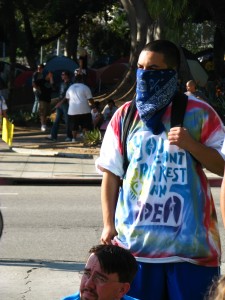

Saturday in the Park – Los Angeles City Hall
The Solidarity March, concerts, workshops, music and revelry around Los Angeles City Hall this weekend were an inspiration in speaking out and re-taking control of our political power. Democracy is not a spectator sport, as they say. In fact, social (and economic) change only comes about by standing up, being present and accounted for, raising signs and our voices, and demonstrating together. The continuing OCCUPY movement is emblematic of this.
In the words of our often errant president on the dedication of the Martin Luther King Jr. National Memorial in Washington DC on the same day: “It is worth remembering that progress did not come from words alone. Progress was hard. Progress was purchased through enduring the smack of billy clubs and the blast of fire hoses. It was bought with days in jail cells and nights of bomb threats. For every victory during the height of the civil rights movement there were setbacks. And there were defeats.”
Mr. Obama continued to surmise that Dr. King would remind us that “The unemployed worker can rightly challenge the excesses of Wall Street without demonizing all who work there. The businessman can enter tough negotiations with his union without vilifying the right to collectively bargain.” May the 99 percent continue to show up and speak out, and may our President also match his powerful words with action, solidarity, and taking risks to upend the debilitating status quo.
[cincopa AYOAMs6vYn1R]
Six Demands for Wall Street from the 99 Percent
From a statement by Vermont Independent Senator Bernie Sanders:
More than three years ago, Congress rewarded Wall Street with the biggest taxpayer bailout in the history of the world. Simultaneously, the US American people have learned that the Federal Reserve provided more than $16 trillion in low-interest loans to every major financial institution in this country, huge foreign banks, multi-national corporations, and some of the wealthiest people in the world.
STORY: Occupy Los Angeles: Thoreau’s “Civil Disobedience”
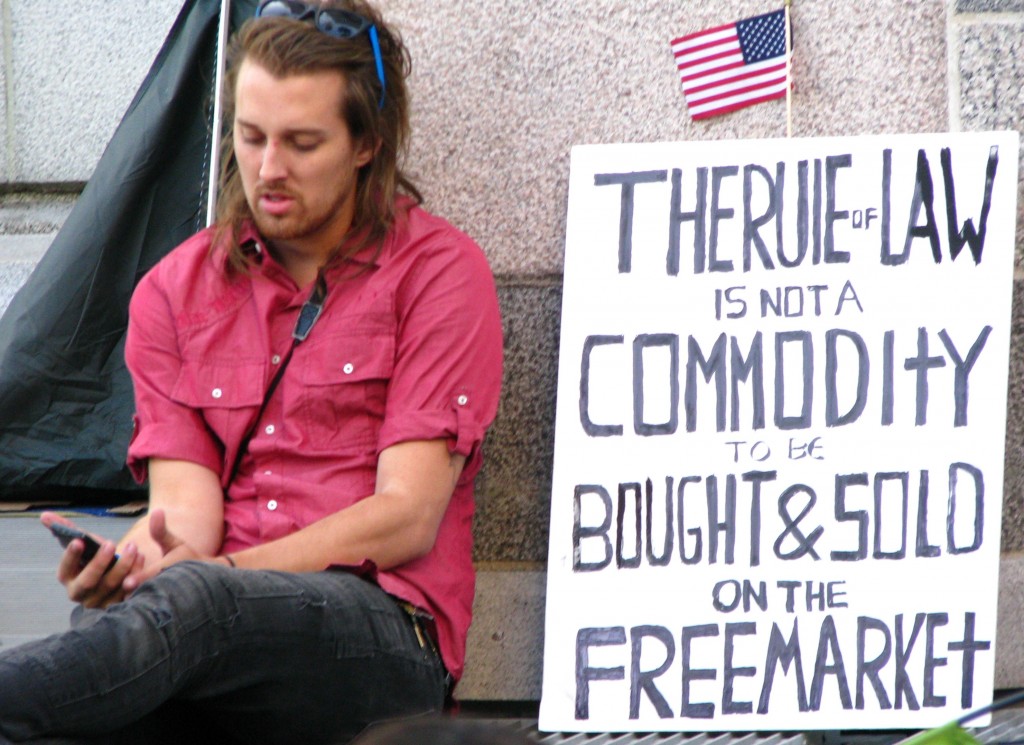

In other words, when Wall Street was on the verge of collapse, the federal government acted boldly, aggressively, and with a fierce sense of urgency to save our financial system from collapse with no strings attached.
Now that the middle class is collapsing and a record-breaking 46 million Americans are living in poverty, the Federal Reserve has failed to act with the same sense of urgency to make sure that small businesses receive the affordable loans needed to put millions of Americans back to work and prevent millions of Americans from losing their homes.


As a result, Wall Street is back to making record-breaking profits, handing out record-breaking compensation packages, and taking the same risks that caused the financial crisis in the first place. Meanwhile, 25 million US residents are unemployed or under-employed; middle class families are making $3,600 less than they did ten years ago; the foreclosure rate is still breaking new records; and the people are still paying over $3.80 for a gallon of gas.
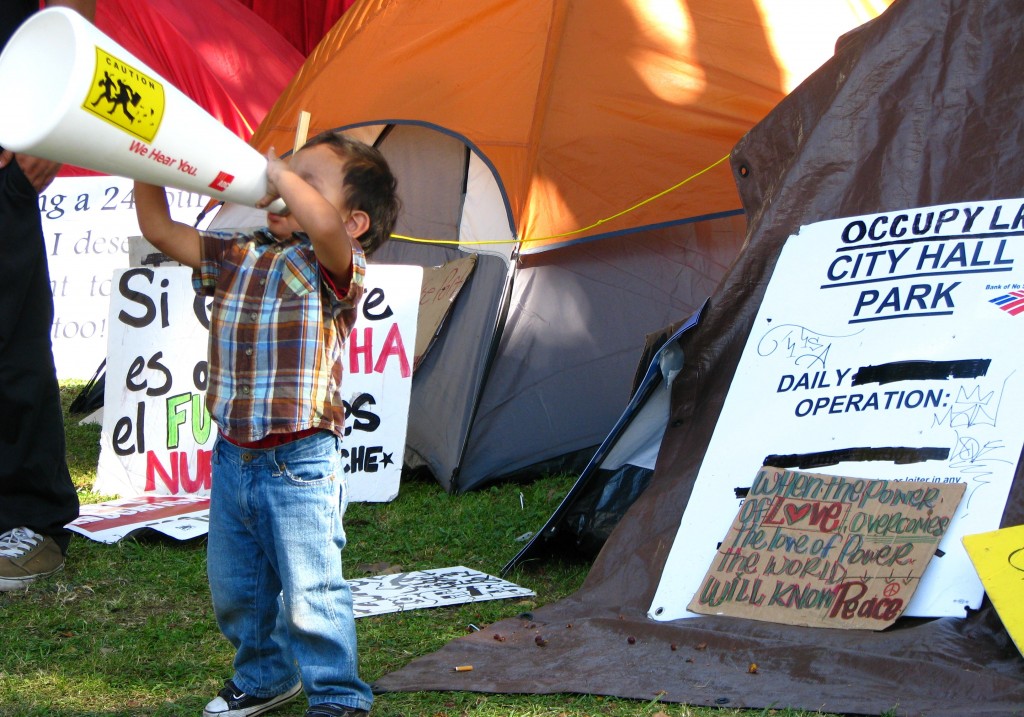

The financial crisis and the jobs crisis have demonstrated to the American people that we now have a government that is of the one percent, by the one percent and for the one percent, as Nobel Prize winning economist Joseph Stiglitz eloquently articulated. The rest of the 99 percent are, more or less, on their own. We now have the most unequal distribution of wealth and income of any major, advanced country on earth. The top one percent earn more income than the bottom 50 percent and the richest 400 Americans own more wealth than the bottom 150 million Americans.
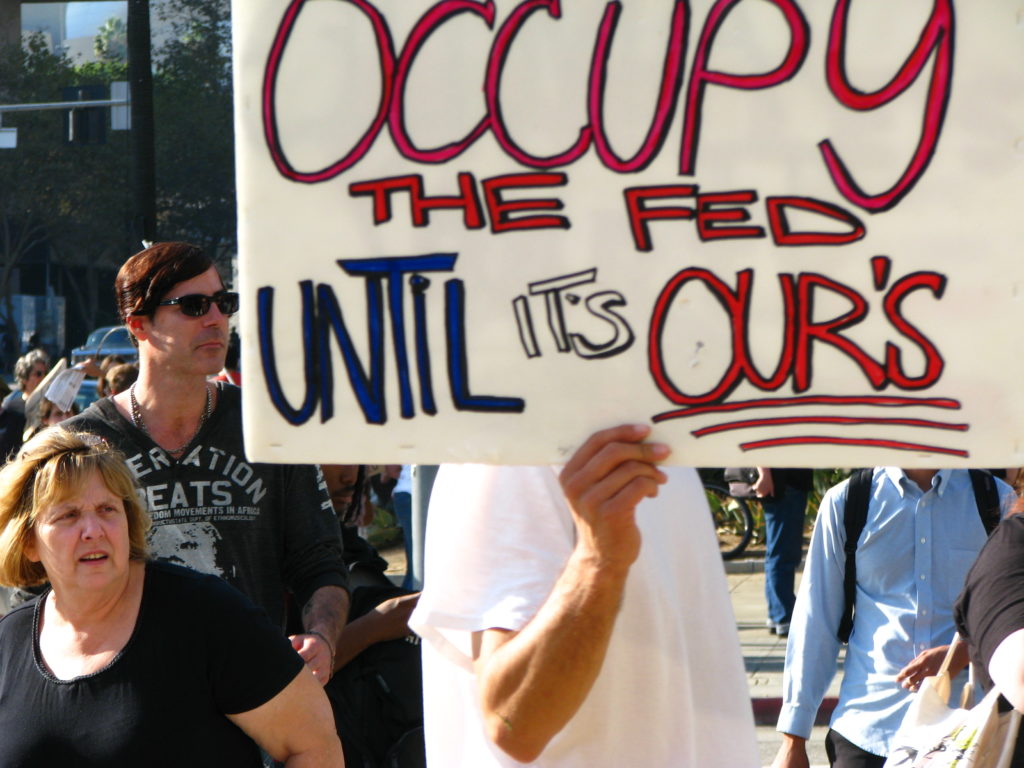

Occupy Wall Street and its sister movements throughout the world have shined spot lights on Wall Street greed and the enormous inequalities that exist in the United States and the world, the question then becomes, how do we change the political, economic and financial system to work for all US Americans, not just the top one percent?


Here are several proposals Senator Sanders is working on:
1) If a financial institution is too big to fail, it is too big to exist. Today, the six largest financial institutions have assets equal to more than 60 percent of GDP. The four largest banks in this country issue two-thirds of all credit cards, half of all mortgages, and hold nearly 40 percent of all bank deposits. Incredibly, after we bailed out these big banks because they were “too big to fail,” three out of the four largest are now even bigger than they were before the financial crisis began. It is time to take a page from Teddy Roosevelt and break up these behemoths so that their failure will no longer lead to economic catastrophe and to create competition in our financial system.
2) Put a cap on credit card interest rates to end usury. Today, more than a quarter of all credit card holders in this country are paying interest rates above 20 percent and as high as 59 percent. When credit card companies charge 25 or 30 percent interest rates they are not engaged in the business of “making credit available” to their customers. They are involved in extortion and loan-sharking. Citigroup, Bank of America, and JP Morgan Chase should not be permitted to charge consumers 25-30 percent interest on their credit cards, especially while these banks received over $4 trillion in loans from the Federal Reserve.
3) The Federal Reserve needs to provide small businesses in America with the same low-interest loans it gave to foreign banks. During the financial crisis, the Federal Reserve provided hundreds of billions of dollars to foreign banks and corporations including the Arab Banking Corporation, Toyota, Mitsubishi, the Korea Development Bank, and the state-owned Bank of Bavaria. At a time when small businesses can’t get the lending they need, it is time for the Fed to create millions of American jobs by providing low-interest loans directly to small businesses.
4) Stop Wall Street oil speculators from artificially increasing gasoline and heating oil prices. Right now, the American people are being gouged at the gas pump by speculators on Wall Street who are buying and selling billions of barrels of oil in the energy futures market with no intention of using a drop for any purpose other than to make a quick buck. Delta Airlines, Exxon Mobil, the American Trucking Association, and other energy experts have estimated that excessive oil speculation is driving up oil prices by as much as 40 percent. We have got to end excessive oil speculation and bring needed relief to American consumers.
5) Demand that Wall Street invest in the job-creating productive economy, instead of gambling on worthless derivatives. The American people have got to make it crystal clear to Wall Street that the era of excessive speculation is over. The “heads, bankers win; tails, everyone else loses” financial system must end. Most important, we need to create a new Wall Street that exists not to reward CEOs and investors for the bets they make on exotic financial instruments nobody understands. Rather, we need a Wall Street that provides financial services to small businesses and manufacturers to create decent-paying jobs and grow the economy by productive means. Think of all of the productive short- and long-term investments that could be made in our country right now if Wall Street used the money it has received from the federal government wisely. Instead of casino-style speculation, Wall Street could invest in high-speed trains; fuel-efficient cars; wind turbines and other alternative energy sources; affordable housing; affordable prescription drugs that save people’s lives; and other things that America desperately needs. That is what we have got to demand from Wall Street.
6) Establish a Wall Street speculation fee on credit default swaps, derivatives, stock options and futures. Both the economic crisis and the deficit crisis are a direct result of the greed and recklessness on Wall Street. Establishing a speculation fee would reduce gambling on Wall Street, encourage the financial sector to invest in the productive economy, and significantly reduce the deficit without harming average Americans. There are a number of precedents for this. The U.S had a similar Wall Street speculation fee from 1914 to 1966. The Revenue Act of 1914 levied a 0.2 percent tax on all sales or transfers of stock. In 1932, Congress more than doubled that tax to help finance the government during the Great Depression. And today, England has a financial transaction tax of 0.25 percent, a penny on every $4 invested.
Making these reforms will not be easy. After all, Wall Street is clearly the most powerful lobbying force on Capitol Hill. From 1998 through 2008, the financial sector spent over $5 billion in lobbying and campaign contributions to deregulate Wall Street. More recently, they spent hundreds of millions more to make the Dodd-Frank bill as weak as possible, and after its passage, hundreds of millions more to roll back or diluter the stronger provisions in that legislation.
Photography by Jessica Aldridge and Jack Eidt
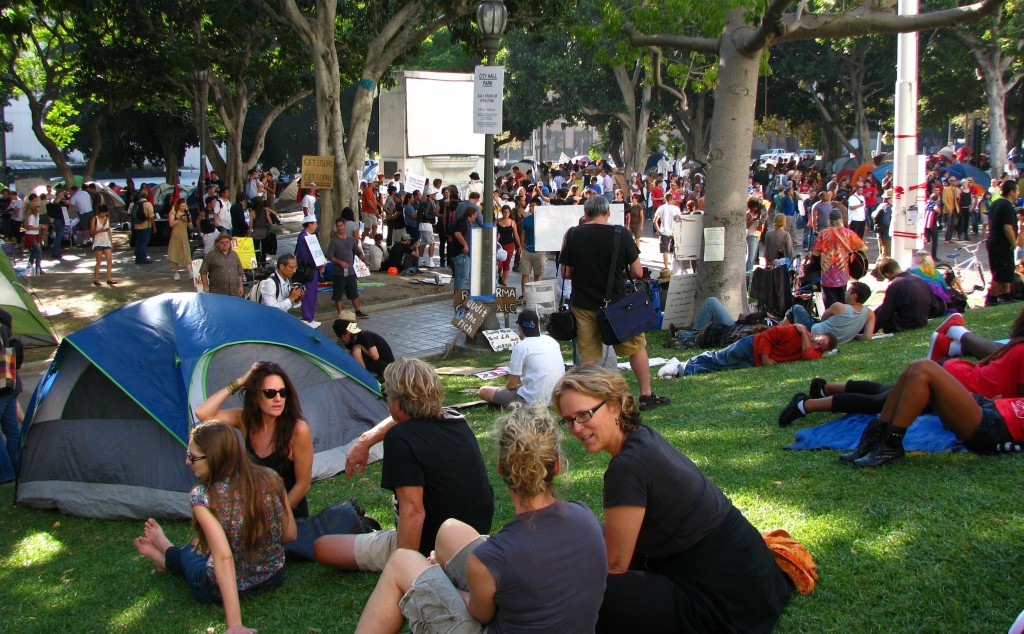


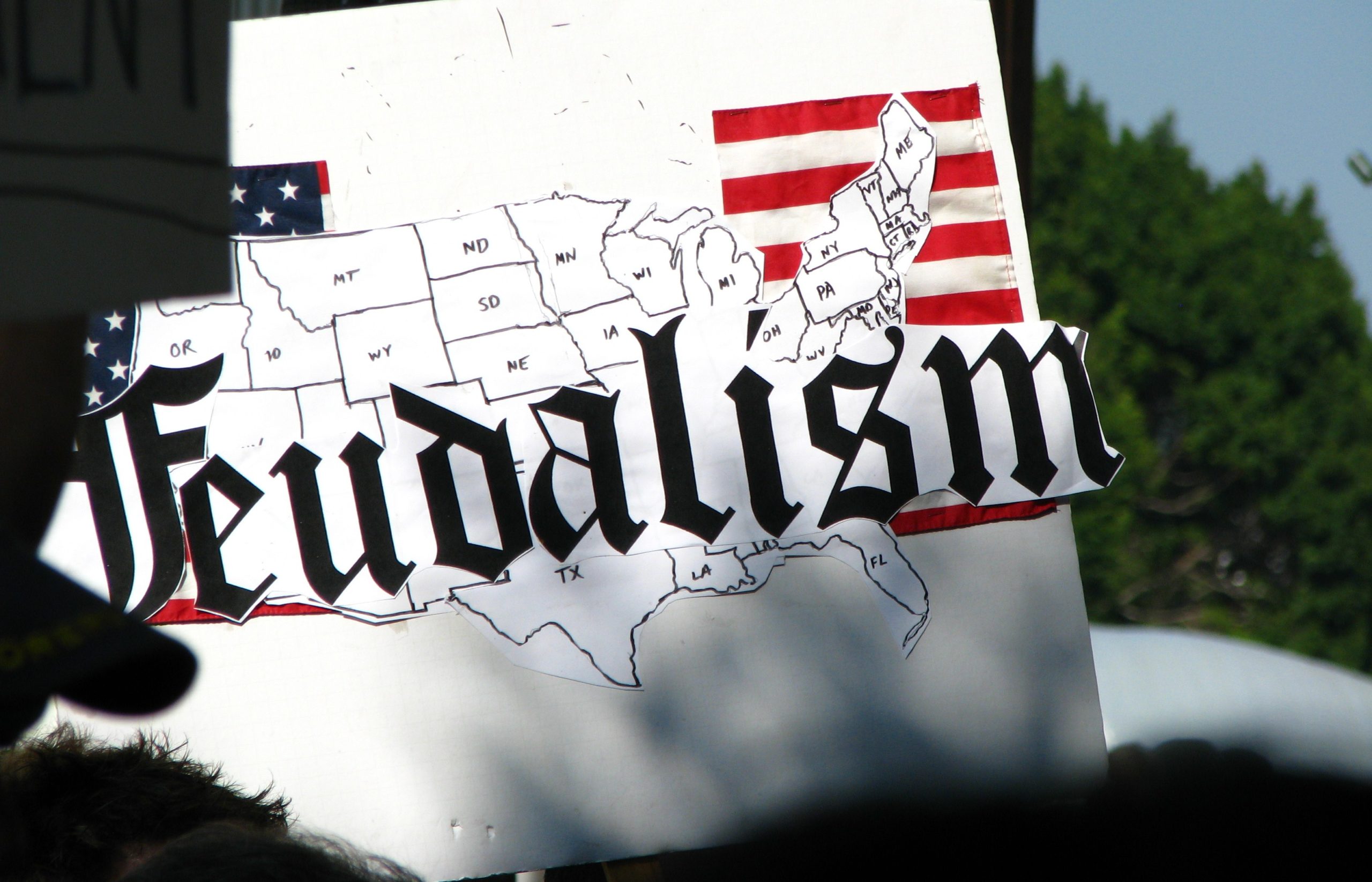

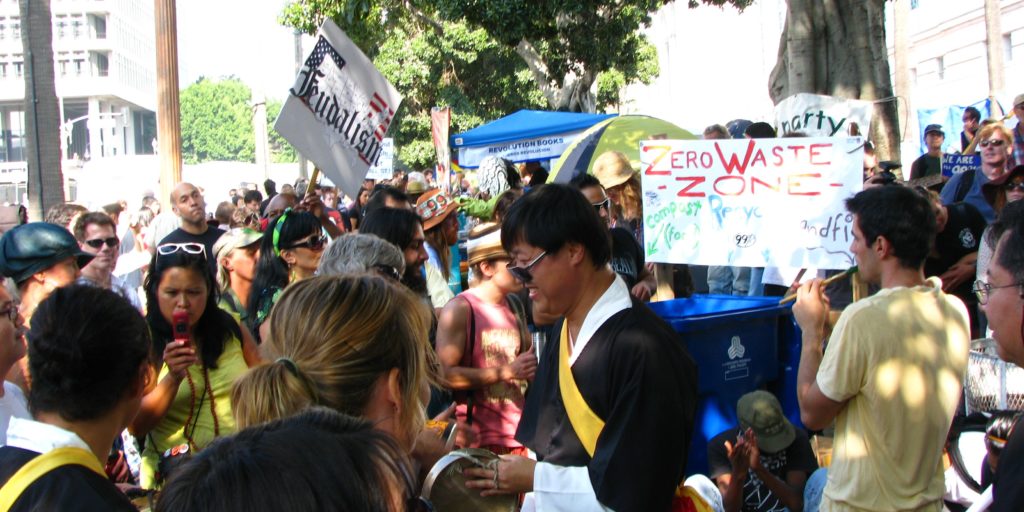











Pingback: Libertarianism Failure: Inequality and the Repeal of Public Protections | WilderUtopia.com